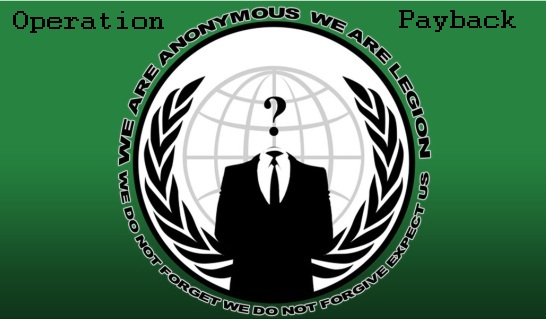"We will not be merciful. We will not be newfags."
Back in 2010, “Operation Payback” involved a series of distributed denial of service (DDoS) attacks against anti-piracy websites as a way to protest what some members of Anonymous viewed as an overly greedy intellectual property industry. The attack was later revived in early 2011.
On Thursday, 13 men were indicted (PDF) in federal court in Virginia on one count of Conspiracy to Intentionally Cause Damage to a Protected Computer. They are accused of using the well-knownLow-Orbit Ion Cannon application to conduct DDoS attacks on the Recording Industry Association of America, the Motion Picture Association of America, the United States Copyright Office of the Library of Congress, Visa, MasterCard, and Bank of America.
According to the indictment, the victims suffered “significant damage,” noting specifically that MasterCard suffered at least $5,000 in losses during a one-year period. (For the record, MasterCard profited $415 million in 2010.)

The indictment also quotes from the original “flier” with instructions as when and how to attack:
The men, who range in age from 20s to their 40s, come from Ohio, Maryland, Texas, New Jersey, Washington, Connecticut, New Hampshire, Arizona, Kansas, South Carolina, Montana, and Massachusetts.
Another court filing (PDF) states that the government has requested an arrest warrant for all 13 men.
“I have no idea what's going to happen at this point.”
One of the defendants, Dennis Owen Collins, had previously been indicted (PDF) in 2011 on charges in the Northern District of California relating to a DDoS attack on PayPal. Collins hung up on Ars twice when he was reached by phone in Ohio.
Collins' attorney, Peter Alan Leeming, told Ars that he and his client were "days away" from reaching a settlement with government prosecutors, which now appears to be "scuttled."
"I think it's most unfortunate that this has happened again for virtually for same conduct," Leeming said. "I'm distressed because the timing of this indictment has undermined the settlement that many people have been working on."
While Leeming declined to detail the terms of Collins' settlement, he described it as being "favorable for all parties."
"[It] involved a certain amount of restitution and terms that the government and defendants could live with," he added. "We had been through lengthy discussions and believed we had worked out a disposition on the case. I've never had [one district file fresh charges shortly before a settlement] happen before, and I've been doing this for more than 27 years. It seems a bit vindictive and punitive but Virginia is entitled to do what they see as appropriate, I guess. I have no idea what's going to happen at this point."
Courtesy: arstechnica



0 comments:
Post a Comment